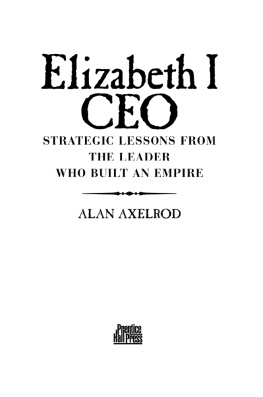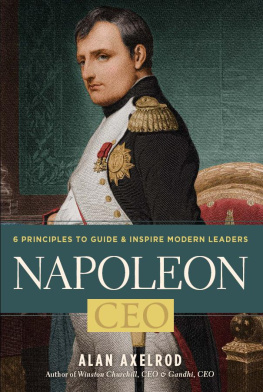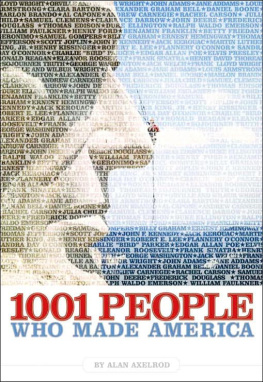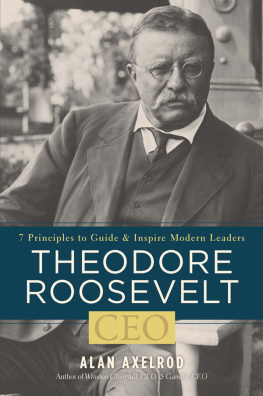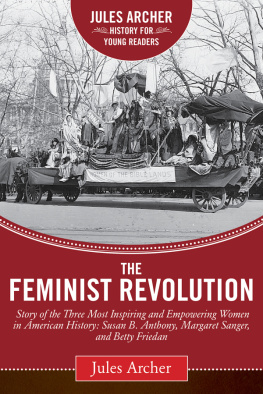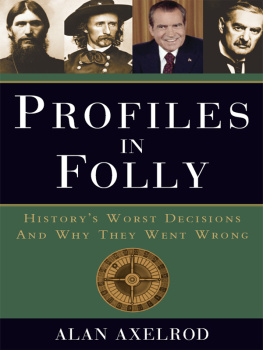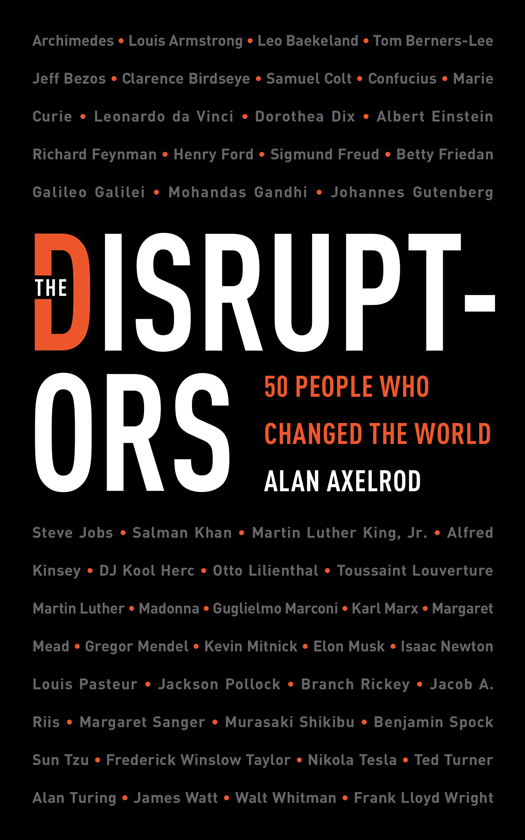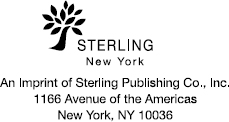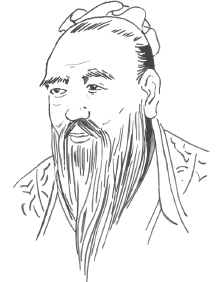STERLING and the distinctive Sterling logo are registered trademarks of Sterling Publishing Co., Inc.
Cover and illustrations 2018 Sterling Publishing Co., Inc.
All rights reserved. No part of this publication may be reproduced, stored in a retrieval system, or transmitted in any form or by any means (including electronic, mechanical, photocopying, recording, or otherwise) without prior written permission from the publisher.
For information about custom editions, special sales, and premium and corporate purchases, please contact Sterling Special Sales at 800-805-5489 or .
INTRODUCTION
CREATIVE DESTRUCTION, DESTRUCTIVE CREATION
Until recently, disruption was a bad word, plain and simple. The 1928 edition of the Oxford English Dictionary defines it as The action of rending or bursting asunder; violent dissolution of continuity; forcible severance. Linguists know that the meanings of words often change over time. They may be subject to what language historians call amelioration, a change from pejorative to neutral or pleasant. For instance, in the days of Geoffrey Chaucer (c. 13431400), the Oxford English Dictionary tells us that the word nice meant foolish, silly, simple or ignorant, senseless, absurd. By about 1500, however, the meaning began to undergo amelioration, morphing at this time to requiring or involving great precision or accuracy. By the 1800s, nice meant kind and considerate, friendly. More frequently than amelioration, words undergo pejoration, a linguistic downgrading from positive to pejorative. Take silly. Go back to Chaucer again, and it essentially meant happy, blissful, blessed. Over the years, it got uglier, coming to mean empty-headed, senseless, foolish.
In the case of both nice and silly, the amelioration and the pejoration took hundreds of years. The amelioration of disruption, however, happened almost instantly and pretty much because of the way one man, Harvard professor and business consultant Clayton M. Christensen, used the word in a 1997 book, The Innovators Dilemma: When New Technologies Cause Great Firms to Fail. In this volume, Christensen coined the phrase disruptive innovation, which describes something new that creates new markets and new relationships between businesses while simultaneously displacing old markets as well as the leading firms and products associated with markets. Disruptive innovation is creative destructionor, if you are on the wrong side of the disruption, destructive creation. In 1997, thanks to Christensen, the word disruption was itself disrupted, undergoing an instant amelioration to something good, positive, and productive.
The amelioration of the term disruptive is recent, but the concept behind creative destruction and destructive creation is as old as humankind. The discovery of fire, for instance, disrupted everything about human lifeboth for the better (warmth and light through the cold, dark night) and for the worse (get too close to the fire and you get burned). Anyone who has raised a child from infancy, or even just knows someone who has, understands that one of the most consequential and dramatic days in a familys life is the day the baby stops crawling, struggles to stand, and then begins to take his or her first steps. To watch the process of those first steps is to witness disruption in its post-Christensen sense. Each step is a disruption of the status quo we call standing. Each step is a falling forwardthe coordinated use of gravity to defy the painful consequences of gravity. Each of us who learns to walk learns an act of disruption.
Disrupting the status quo with every step is a common human attribute. Carrying such a disruption into other human activities can be an uncommon human attribute, the lofty province of heroes and geniuses. We admire and envy the disruptors among us because they represent the best, the most spectacular achievements of which human beings are capable. The disruption that is two-legged upright walking takes you from place to place. The kind of disruption created by historys great disruptors takes all of humanity from place to place. In the process, it destroys certain features of society and civilization while creating new ones. Creating new possibilities usually requires clearing away some of the old.
This book profiles fifty disruptors, from Confucius, who lived in the sixth century BCE , to Elon Musk, who was born in 1971. The disruptors in this book are drawn from the fields of philosophy and religion, art and literature, science, technology, enterprise, education, society, and popular culture. By definition, they are all innovators, because all disruption (in Christensens ameliorative sense of the word) is, perforce, innovative. But not all innovators are disruptors, because not all innovations are disruptive. The IBM Selectric typewriter, introduced in 1961, with its interchangeable typing element (its typeball) was highly innovative, but it did not disrupt the market for typewriterseven those that had the traditional individual rising and falling typebars. The advent of the personal computer was a disruptive innovation, which rapidly destroyed the market for typewriters. Both innovators and disruptors make and build. But disruptors also change how we think, act, do business, learn, and live. The most profound disruptions change civilization itself. And in this book you will meet fifty creators of just such disruptions. Some of the names will be familiar, others not so much.
My chief criterion for choosing disruptors for this particular Hall of Fame is that the candidates disruption or disruptions (many disruptors produce more than onethey just cant help themselves) unarguably transformed philosophy, religion, art, literature, science, technology, enterprise, education, society, or popular culture sufficiently to leave a mark on civilization, on the way we live and think and experience the world around us. I have no illusion that my selection will settle any arguments. On the contrary, I expect it will start some. Thats fine with me. But remember that fifty human beings plucked from some 2,700 years of global history cannot possibly be more than a mere sample. I invite you to gather some of your own disruptive heroes, thinkers, inventors, and innovators. Maybe build your own book, blog, vlog, feature film, interactive game, or thought experiment. Perhaps start a club, a foundation, a religion, a cult, or a country. Or begin more modestly. Next time you walk your dog, pot-bellied pig, or ferret, walk him or her around the block counterclockwise or around a different block clockwise. We all need disruption.
PHILOSOPHY AND R ELIGION
DISRUPTION:
Introducing education and teachers to civilization
C onfucius
( C . 551 BCE C . 479 BCE )
Active in China during the sixth century BCE , Confucius created the philosophy named for him. Confucianism may be regarded as a humanistic religion, which has served as the basis for society, government, and a simplified, virtuous way of life. Few individuals have been more influential in history, since Confucianism has influenced, even shaped, millennia of Chinese and other Asian civilizations from ancient times to the present. Mao Zedong was profoundly influenced by the teachings of Confucius. As a moral force, Confucius may be compared to any major Western religious figure, since the emphasis of his teaching was on living a life of virtue informed by extreme reverence for ones ancestors. Where the subjects of rule and government were concerned, Confucius wrote of the moral responsibility of rulers, whose duty, he believed, was to be frugal and benevolent, embodying an inner harmony that would of necessity be reflected in the harmony of the people they governed.




